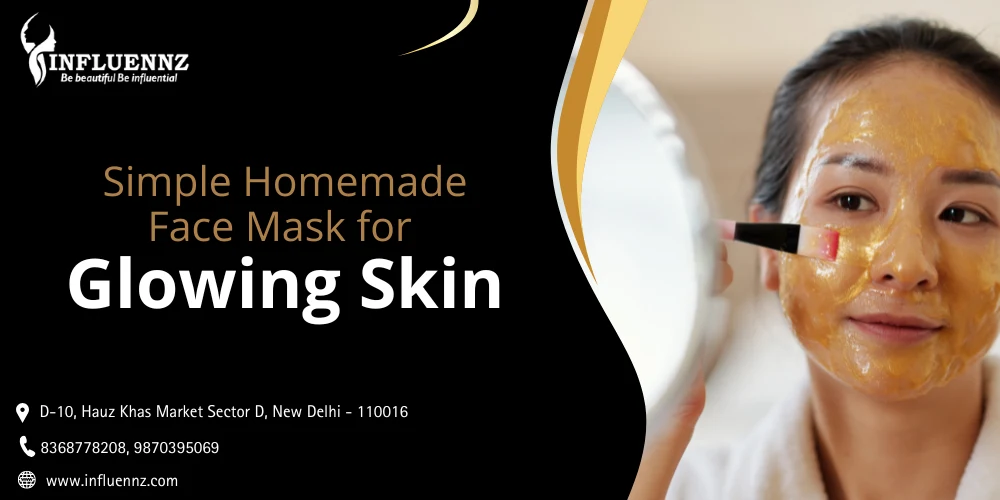Our mothers and grandmothers never had access to the latest technologies or the advanced beauty treatments like fillers and Botox, yet they aged gracefully and looked younger with the help of many kitchen ingredients. I, Dr. Geetika Srivastava, your skin expert from AIIMS and founder of Influennz Skin Clinic, am here to tell you the science behind Homemade Face Masks for Glowing Skin, the properties of various kitchen ingredients, and how one should prepare a home mask in the first place.
How to Find Your Skin Type
Just like skincare products are designed for different concerns and skin types, DIY face masks also need to be tailored accordingly. So, before diving into homemade remedies, it’s essential to understand your skin type.
From a dermatologist’s perspective, there are three primary skin types:
- Dry Skin: Appears dull and flaky, is often sensitive to new products, and may show early signs of aging. Rarely prone to acne but needs consistent moisturization.
- Oily Skin: Characterized by overactive oil glands, open pores, and a tendency toward acne. Glowing skin is common, but breakouts are a regular issue.
- Normal Skin: Balanced and relatively problem-free. Most ingredients and products suit this skin type. However, only about 10% of the population has truly normal skin.
Once you’ve identified your skin type and concerns (acne, uneven tone, tanning, or even hair fall), you can choose the right DIY remedies accordingly.
Kitchen Ingredients for Homemade Face Masks to Brighten Skin
Creating a face mask is similar to cooking, it helps to know what each ingredient brings to the table. Here are some powerhouse kitchen staples and their skincare properties:

- Turmeric (Haldi): Contains curcumin, which has anti-inflammatory, antiseptic, antioxidant, and skin-brightening effects. Traditionally used in bridal beauty rituals.
- Honey: Rich in sugars, vitamins, minerals, and enzymes. It’s antifungal, antibacterial, and anti-inflammatory, but most importantly, it’s a humectant—perfect for dry and sensitive skin.
- Egg White: Contains albumin, which tightens pores, reduces oiliness, and offers a mild lifting effect. Also great as a hair conditioner.
- Tulsi: Revered in Indian households, tulsi is anti-bacterial, comedolytic, and anti-inflammatory, ideal for acne and oily skin.
- Aloe Vera: A soothing, anti-inflammatory moisturizer for all skin types. Also helps with rashes and sunburn.
- Milk & Milk Products (Curd, Cream): Rich in lactic acid (an AHA) that gently exfoliates dead skin, revealing brighter skin.
- Gram Flour (Besan): A natural cleanser and exfoliant that unclogs pores and improves brightness.
- Sandalwood: Known for its calming, soothing effects, perfect for dry or sensitive skin.
- Amla, Ritha & Shikakai: Ayurvedic trio for hair and skin. Ritha cleanses, amla is high in vitamin C, and shikakai conditions hair.
- Saffron: Reduces pigmentation and dark spots, improves texture, and provides antioxidant protection.
- Rose Water: Acts as a natural toner and face mist. Hydrates and preps skin before makeup.
- Rice Water: A Korean beauty favorite, used as a toner or mist. Hydrates and brightens.
- Neem: Antibacterial and healing, neem is excellent for acne-prone skin and even oral hygiene.
- Tea Tree Oil: Controls sebum production (sebolytic), combats acne, and treats dandruff and oily scalp.
- Papaya: Contains the enzyme papain, a gentle exfoliator that brightens and smoothens skin.
Read also : How to Get Glowing Skin in Summer
12 Simple DIY Homemade Face Masks for Glowing Skin
Masks that can work as cleansers or face washes
1. For dry skin: Honey and milk mask
- Steps: Mix honey and milk. Let it dry for 10 to 15 minutes, and wipe it off using a cotton bud.
- Benefits: Milk has lactic acid that will gently exfoliate the skin. Honey will hydrate due to its hygroscopic properties
2. For normal to oily skin: Haldi, curd, and besan mask
- Steps: Mix ½ teaspoon of haldi powder with 2 teaspoons of besan and use curd as a binding agent till you reach a semi-liquid consistency. Apply this paste on your face and let it dry, Wash with water.
- Benefits: Turmeric lightens the skin, besan exfoliates the skin physically, while lactic acid in the curd is a chemical exfoliant.
DIY masks that can work as shampoos and conditioners
3. For all hair types: Amla, ritha, shikakai hair mask
- Steps: In a bowl, mix equal parts of amla, ritha, and shikakai. These 3 in combination, not only cleanse the scalp but also condition the hair strands.
- Benefits: Regular use of this helps in combating dandruff as well.
DIY masks for acne-prone skin
4. Neem, tulsi, and multani mitti face pack
- Steps: Mix 1 tablespoon of neem powder with 1 tablespoon of multani mitti and 1 tablespoon of tulsi powder. Mix using coconut water or normal water. Apply the paste for 15 minutes and then rinse off. Use this alternate day till the acne dries off.
- Benefits: Neem and tulsi are antibacterial, while multani mitti dries out the acne due to its oil-control properties.
5. Tea tree oil, aloe vera, and rose water pack
- Steps: Mix a few drops of tea tree oil with 2 teaspoons of aloe vera and 1 teaspoon of rose water. Mix and apply. Wash when dry.
- Benefits: Tea tree is sebolytic, and rose water has astringent properties.
Mask for uneven skin tone and tanning
6. Saffron, milk, and sandalwood mask
- Steps: Infuse 50 ml of milk with a few strands of saffron and keep it in the fridge overnight. Mix 1 tablespoon of sandalwood powder in this mixture before applying. It can be used once a week.
- Benefits: Milk and sandalwood have skin-lightening properties. Saffron is rich in antioxidants and removes UV-induced damage.
Also Read: Korean Glass Skin Facial Treatment
7. Tomato and yogurt mask
- Steps: Mix tomato juice with yogurt and apply to face. Leave for 15 minutes and rinse.
- Benefits: Tomato has lycopene, which is an antioxidant. It also has citrus properties to combat tanning. Yogurt has lactic acid to chemically exfoliate the skin.
DIY mask that can work as a toner or face mist
8. Rose water
- Steps: Soak rose petals in distilled water. Keep on the stove under a low flame. Let it simmer for 30-45 minutes or till the petals lose their colours. Cool and store in a spray bottle.
- Benefits: Hydration and glow.
9. Rice water
- Steps: Take 1 cup of rice and mix 2 cups of water in it, and soak it overnight. Strain it in the morning and let it ferment for a few days.
- Benefits: Hydration and glow.
DIY masks that can work as scrubs and exfoliants
The ubtans and lepas are nothing but body scrubs, exfoliants, and body wraps. They are the traditional counterpart of body polishing. One of my favourite body scrubs is mashing sugar and oil together. The sugar crystals act like an exfoliator while the oil helps in moisturization.
DIY mask for dry skin
10. Banana, honey, and oatmeal mask
- Steps: Take half a half-ripe banana, 1 tablespoon honey, and 2 tablespoons oats soaked overnight in milk. Grind them in the mixer and apply as a paste. Do this alternate day till skin feels soft and supple.
- Benefits: Banana has anti-oxidants, honey is anti-inflammatory, and oatmeal is both a moisturizer and an exfoliant.
Any mask for dry skin should have milk and cream as the base
Read also: Pre-Bridal Skin Care
DIY mask for oily skin
11. Multani mitti mask
Also known as bentonite clay or Indian volcanic clay, a simple multani mitti mask can work wonders for oily skin and acne-prone skin. You can even apply this mask to areas that are prone to boils due to friction.
For oily skin, the base of DIY should always be water or coconut water
DIY mask for sensitive skin
12. Sandalwood, yogurt honey mask
- Steps: Mix 1 tablespoon of sandalwood powder with 1 teaspoon of honey and 2 tablespoons of yogurt. Mix and apply as a paste. Rinse with water or milk.
- Benefits: Repairs the skin barrier. Promotes hydration.
DIY masks for sensitive skin should have sandalwood and an aloe vera base.
Want Glowing Skin That Lasts? Let’s Talk Transformation! (CTA)
DIY face masks are a great start, but for deeper, long-lasting results, your skin deserves expert care.
At Influennz Clinic, we specialize in personalized skin transformation solutions, from advanced skin whitening treatments to clinical care for acne, pigmentation, and dullness.

Precautions before using a Face mask for Glowing skin
Always skip the following ingredients:
- Anything acidic, like vinegar(acetic acid)and lemon juice(citric acid)
- Anything alkaline, like antiseptic liquids or baking powder.
Conclusion
Nature holds many secrets to radiant skin, and your kitchen is a great place to start. These homemade face masks are simple, safe, and effective when tailored to your skin type. But for visible, lasting changes, a blend of science and tradition is often the best route.
Here’s to glowing, healthy skin—naturally and clinically




